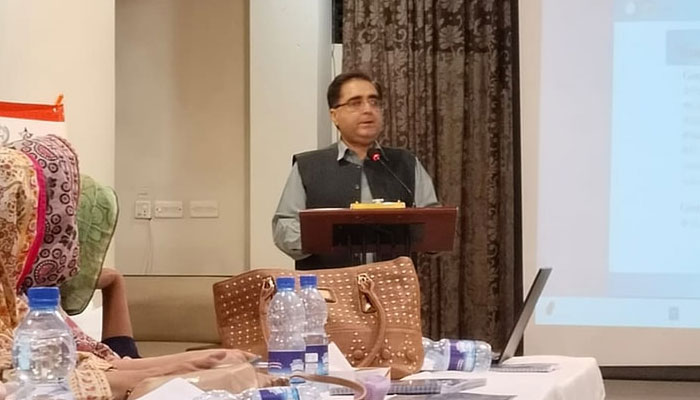Surgical equipment provided to midwives
Dr Shah says that MNCH programme, in collaboration with JICA, has been operating in remote parts of KP, including Mansehra
MANSEHRA: The Maternal, Newborn, and Child Health (MNCH) programme in collaboration with Japan International Cooperation Agency on Sunday provided surgical equipment to qualified midwives to establish birth stations in remote parts of Mansehra and Torghar districts.
“We are implementing a comprehensive strategy to set up birth stations in remote parts of the Hazara division to reduce maternal and infant mortality rates,” Dr Shah Faisal Khanzada, the district health officer, told a ceremony at the Community Midwifery School here.
The surgical equipment was given away to 14 qualified midwives for birth stations in the both districts.
“These midwives, who have previously undergone modern training courses in obstetrics, as well as pre-and post-natal care, will establish birth stations in remote areas of both the districts,” Dr Khanzada said. He said that the MNCH programme, in collaboration with JICA, has been operating in remote parts of Khyber Pakhtunkhwa, including Mansehra, Battagram, and Torghar, where 24 such stations have already been established.
Dr Tariq Shah, a representative of the international programme, said that Dr Khizra Hayat, provincial coordinator for MNCH in Khyber Pakhtunkhwa, has been focusing on addressing maternal and infant health issues, particularly in rural areas.
The event was also attended by divisional social organiser for MNCH in Hazara, Hameed Turabi; district head Sayyar Khan and others.
“This is why local educated girls are first trained in modern healthcare and obstetric practices and then deployed in their respective communities to provide essential healthcare and obstetric services to pregnant and lactating mothers,” said Turabi.
-
 Michael B. Jordan Makes Bombshell Confession At Actor Awards After BAFTA Controversy: 'Unbelievable'
Michael B. Jordan Makes Bombshell Confession At Actor Awards After BAFTA Controversy: 'Unbelievable' -
 Prince William Willing To Walk Road He ‘loathes’ For ‘horror Show’ Escape: ‘He’s Running Out Of Allies Fast’
Prince William Willing To Walk Road He ‘loathes’ For ‘horror Show’ Escape: ‘He’s Running Out Of Allies Fast’ -
 Pentagon Says No Evidence Iran Planned Attack On US, Undercutting Strike Justification
Pentagon Says No Evidence Iran Planned Attack On US, Undercutting Strike Justification -
 Prince William’s Changes Priorities With Harry After Kate Middleton’s Remission: ‘It Couldn't Be Worse’
Prince William’s Changes Priorities With Harry After Kate Middleton’s Remission: ‘It Couldn't Be Worse’ -
 Justin Bieber Gets Touching Tribute From Mom Pattie Mallette On Turning 32 Amid Limited-edition Birthday Drop
Justin Bieber Gets Touching Tribute From Mom Pattie Mallette On Turning 32 Amid Limited-edition Birthday Drop -
 Jada Pinkett Smith Details How Her Memoir Combats 'shame' Around Alopecia
Jada Pinkett Smith Details How Her Memoir Combats 'shame' Around Alopecia -
 Harrison Ford Reflects On Career As He Receives Life Achievement Award At 2026 Actor Awards
Harrison Ford Reflects On Career As He Receives Life Achievement Award At 2026 Actor Awards -
 Timothee Chalamet's Red Carpet Date For Actor Awards Not Kylie Jenner This Year
Timothee Chalamet's Red Carpet Date For Actor Awards Not Kylie Jenner This Year -
 Weather Forecast For Tomorrow: Wintry Mix Overnight And Warmer Temps Midweek
Weather Forecast For Tomorrow: Wintry Mix Overnight And Warmer Temps Midweek -
 Keith Urban 'solitary' Life Laid Bare After Nicole Kidman Split
Keith Urban 'solitary' Life Laid Bare After Nicole Kidman Split -
 SAG Actor Awards 2026 Winners: Complete List
SAG Actor Awards 2026 Winners: Complete List -
 UK Asylum System Faces Changes As Refugees Will Get Temporary Protection Only
UK Asylum System Faces Changes As Refugees Will Get Temporary Protection Only -
 Meghan Markle Has Realised ‘star Power’ Is Not Enough After Jordan Trip
Meghan Markle Has Realised ‘star Power’ Is Not Enough After Jordan Trip -
 USC Leading Scorer Chad Baker-Mazara Leaves Program Amid Losing Streak
USC Leading Scorer Chad Baker-Mazara Leaves Program Amid Losing Streak -
 Google Is Winding Down Popular App 'Pixel Studio': Here's Why
Google Is Winding Down Popular App 'Pixel Studio': Here's Why -
 Zendaya, Tom Holland Secretly Married?
Zendaya, Tom Holland Secretly Married?




